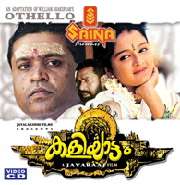Kaliyattam
Kaliyattam (English: The Play of God) is a 1997 Indian Malayalam-language film directed by Jayaraaj. It stars Suresh Gopi, Lal, Manju Warrier, and Biju Menon.[1][2] The film is an adaptation of William Shakespeare's play Othello,[3] set against the backdrop of the Hindu Theyyam performance.[4][5][6][7] Suresh Gopi plays Kannan Perumalayan, the equivalent to Othello. Lal plays Paniyan, the equivalent to Iago. Manju Warrier plays Thamara, the Desdemona version. And Biju Menon plays Kanthan, Cassio's role. Suresh Gopi's role as Kannan Perumalayan was critically acclaimed and it was considered as one of his finest acting performances in his career.
| Kaliyattam | |
|---|---|
 VCD cover | |
| Malayalam | കളിയാട്ടം |
| Directed by | Jayaraaj |
| Produced by | K. Radhakrishnan |
| Screenplay by | Balram Mattanoor |
| Based on | William Shakespeare's Othello |
| Starring | Suresh Gopi Lal Manju Warrier Biju Menon |
| Music by | Kaithapram Rajamani (Film score) |
| Cinematography | M J Radhakrishnan |
| Edited by | |
Production company | Jayalakshmi Films |
| Distributed by | Surya Cine Arts |
Release date | 1997 |
Running time | 130 minutes |
| Country | India |
| Language | Malayalam |
In 1998, Suresh Gopi received the National Film Award for Best Actor and Kerala State Film Award for Best Actor for his critically acclaimed performance. Jayaraaj won the award for Best Director for his work on the film. The film was a critical and commercial success.[8][9]
Plot
This is an adaptation of Shakespeare's Othello, revolving around Kannan Perumalayan (Suresh Gopi)), a Theyyam artist who corresponds to Othello, and Thamara (Manju Warrier), the beautiful daughter of the village head. While Unni Thampuran hates Kannan because he had a crush on Thamara, and Paniyan, (Lal) who plays a Koomali, covets the role of Theechamundi which Perumalayan holds. Paniyan plants the seeds of doubt about Thamara's fidelity in Kannan's mind, making him suspect that Thamara and his assistant Kanthan (Biju Menon) are having an affair. Kannan spots a silk robe which he had presented to Thamara in Kanthan's hands.
Kannan, out of grief and anger, takes Thamara's life by suffocating her with a pillow. On the same night, Paniyan plans to get Kanthan killed by Unni Thampuran, but the plan goes awry and Thamburan is killed. Amidst these events, Kannan is told of his mistake by Paniyan's wife Cheerma, before Paniyan murders her. Kannan overpowers Paniyan, crushing his legs with a stone, and allows him to live the rest of his life crippled. Kannan Perumalayan gives the Theechamundi role to Kanthan and commits suicide in the Theyyam ritual fire.
Cast
- Suresh Gopi as Kannan Perumalayan (Othello)
- Lal as Paniyan (Iago)
- Manju Warrier as Thamara (Desdemona)
- Biju Menon as Kanthan (Cassio)
- Bindu Panicker as Cheerma (Emilia)
- Narendra Prasad as Thamburan (Brabantio)
- E.A.Rajendran as Unni Thampuran (Roderigo)
Awards
- National Film Award for Best Director - Jayaraaj
- National Film Award for Best Actor - Suresh Gopi
- Filmfare Awards 1997
- Filmfare Award for Best Director - Malayalam - Jayaraj
- Filmfare Award for Best Music Director - Malayalam - Kaithapram
- Kerala State Film Award for Best Actor - Suresh Gopi
- Best Film with Popular Appeal and Aesthetic Value
- Best Music Director - Kaithapram
- Best Female Playback Singer - ;Bhavana Radhakrishnan
Soundtrack
The music and lyrics were composed and written by Kaithapram Damodaran Namboothiri.
| Song | Playback |
|---|---|
| "Ennodenthinee Pinakkam"[2] | Bhavana Radhakrishnan |
| "Vannathi Puzhayude" | K. J. Yesudas |
| "Velikku Veluppaankaalam" | K. J. Yesudas |
| "Ennodendinee Pinakkam" | K. J. Yesudas |
| "Kathivanoor Veerane" | Kallara Gopan |
| "Kathivanoor Veerane" | Sreeja |
| "Ezhimalayolam" | Kaithapram |
| "Sree Raagam Paadum Veene" | K. J. Yesudas, Sujatha |
| "Paadathe Paadunna Raagam" | M. G. Sreekumar |
References
- "List of Malayalam films released during the year 1997". PRD, Government of Kerala. Retrieved 7 October 2009.
- "Kaliyattam [1998]". malayalasangeetham.info. Retrieved 7 October 2009.
- Radhakrishnan, Sruthi (23 April 2018). "400 years later, Shakespeare still remains relevant in Indian cinema". The Hindu. ISSN 0971-751X. Retrieved 7 December 2018.
- Hodgdon, Barbara; Worthen, William B. (2005). A Companion to Shakespeare and Performance. Blackwell Companions to Literature and Culture. Wiley-Blackwell. pp. 130–131. ISBN 978-1-4051-1104-1.
- "Kaliyattam". BizHat.com. Retrieved 7 October 2009.
- "jayaraj". cinemaofmalayalam.net. Archived from the original on 26 April 2012. Retrieved 7 October 2009.
- Sandeep, K. M. (26 June 1997). "Monsoon moods on film". The Indian Express. Retrieved 7 October 2009.
- "Thai Saheb bags national award for best film". The Indian Express. 10 May 1998. Retrieved 7 October 2009.
- "Indrani Haldar, Karisma bag national awards". Rediff.com. 9 May 1998. Retrieved 7 October 2009.
External links
- Kaliyattam on IMDb